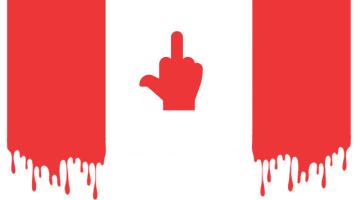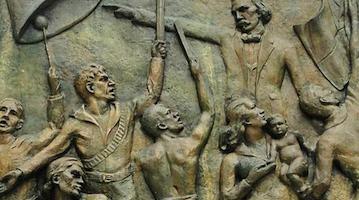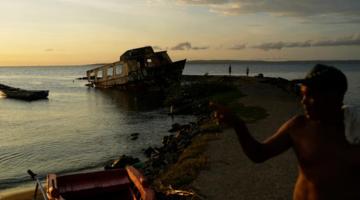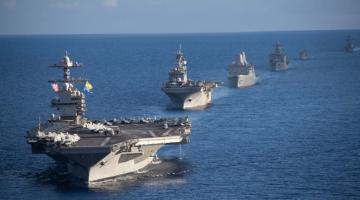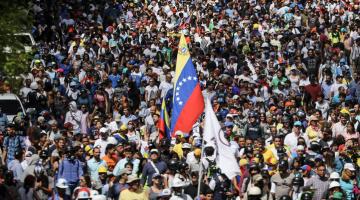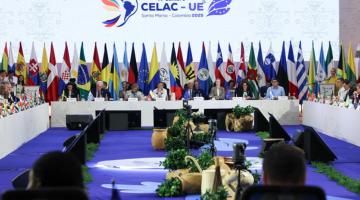A 1971 statement shines a bright white light on the long history of Canadian imperialism in the Caribbean.
Just like Canadian racism, Canadian imperialism likes to hide behind a veil of innocence and benevolence – or it lurks, shadowed and half-seen behind the brash and belligerent policies of the United States. Yet, as the panelists on a recently-held Black History Month webinar hosted by the Canadian Foreign Policy Institute uniformly agreed, when it comes to the question of imperialism in the Caribbean, Canada is not merely a surrogate to the US, nor has it merely followed the orders and actions of its powerful neighbor. Instead, Canada’s foreign policy has been independent and assertive, guided by the interests and appetites of Canadian mining companies, insurance firms, banking and financial institutions, military contractors, and other corporate entities. No wonder Canada’s prime minister Justin Trudeau has been eager to send military hardware to Haiti to support the unelected and unpopular regime of Ariel Henry.
Some fifty years ago, in 1971, the Caribbean International Service Bureau (CISB), produced a succinct yet stunning overview of Canada’s colonial history in the Caribbean. Based in Montreal, the CISB was founded by a group of Caribbean based activists, students, workers, and intellectuals with the aim of advocating for Black rights and self-determination in Canada and the Caribbean. Their name was drawn from the International African Service Bureau (IASB), the organization founded in London in 1937 with the motto, “for the defense of the Africans and for people of African descent.” IASB members included, Amy Ashwood Garvey, T. Ras Makonnnen, Jomo Kenyatta, George Padmore , I.TA. Wallace-Johnson, and C.L.R. James. James provided both the inspiration for the CISB, and a living connection to the IASB and the pan-African agitation of an earlier era. As David Austin has shown, James, who had spent a few crucial years in Montreal in the late sixties, served as a mentor to CISB founders including Alphonso “Alfie” Roberts, a Vincentian cricketer and political activist.
The CISB’s essay “Canada in the Caribbean,” was published in the February 18, 1971 issue of the student newspaper, the McGill Free Press. Editorial control of the issue, dubbed the “Black Spark Edition,” was taken over by CISB members as a way to mark the second anniversary of the notorious Sir George Williams Affair, an incident that exposed both the depths of Canadian racism and Canadian imperial policy in the Caribbean. Significantly, the CISB’s title – the Black Spark Edition –recalls Lenin's early-twentieth century broadsheet Iskra (or, “spark,” in Russian) and Kwame Nkrumah's The Spark, published by the Bureau of African Affairs in the 1960s. In their opening editorial the CISB invoked “the International African Service Bureau and other black organizations, who would dialectically combine the race and the class question in the first half of the century and apply it in mass anticolonial action particularly in Ghana, in Africa, while simultaneously people in the oppressing countries.”
The CISB self-consciously saw themselves as continuing that “educating, agitating and propagandizing” project with the Black Spark Edition. The edition contained articles on Canada and racism, on Duvalierism, on Eastern Caribbean independence, and on gender and womanhood. They also published essays by Fidel Castro, Nicholas Guillen, Rene Depestre, Karl Marx, as well as a handful of pieces by CLR James.
In some ways, “Canada in the Caribbean” ties all of the other pieces together. Drawing on Canadian white papers, policy documents, the financial press, and political journals, the CISB authors provide the historical context for understanding how Canada’s Caribbean interests developed. And they show precisely what those interests are – be they in money, mining, or militarism. As Canada embarks on another imperial mission in Haiti, the CISB’s essay provides a useful primer on Canadian colonialism in the Caribbean. And it is a reminder that there is neither innocence nor benevolence behind Canada’s actions.
Canada in the Caribbean
Caribbean International Service Bureau
Between 1789 and 1871 Western Europe crystallized into relatively settled bourgeois national capitalist states. On the other hand the Caribbean, Africa and Asia were all subjugated, oppressed and exploited by colonialism and nascent imperialism.
Canada officially became a nation in 1867, and fifty years later was staking “...a claim to the Caribbean colonies….” But being herself economically controlled by British and American capital, Canada could not consummate that claim to the Caribbean and had to settle for integration as a national state capital within the continental ambit of surplus capital exportation. Today, Canada is an important adjunct of one of the two most gigantic concentrations of national state capitals in the world which are attempting to “... force into their orbit by force, or fraud, or cajolement, all national units.” And Canada is now openly entering the Caribbean arena as a political ally and economic extension of the United States to help retain in the Anglo-American orbit, the English-speaking Caribbean, and using “cajolement” and “fraud” to achieve this end.
In a paper prepared by a Canadian capitalist in 1966 and entitled “A Proposal for a New Canadian-West Indies Relationship'' the imperialist attitude toward the seeking and safe-guarding of profit in the Caribbean was stated in the following preamble that ever “...since the mid-fifties when Canada took the lead in the Suez solution, our reputation as a do-something nation’ in foreign affairs has been eroding…”, and to halt this erosion, it would be “...immeasurably better if Canada could once again emerge in the world spotlight as a nation with initiative and imagination – one which uses its resources to make the greatest impact… and reap the admiration of our neighours and allies.” Then coming closer to his point, the businessmen urged Canadian capitalists to “...choose an area of concentration – an area which, by its nature, geography and size, presents a manageable problem for Canada.” Continuing, the tycoon then pointedly suggested that Canadian investors did not have to “...look far afield for such an opportunity...,” for on Canada’s doorstep lay an “...area which historically and by common parentage is within Canada’s orbit.” This is very similar to the old imperialist pronouncement by old American President John Quincy Adams who had mused that Cuba was like a ripe apple in the gravitational orbit of North American imperialism, and when ripe must fall into his country’s lap. The Canadian agent of capital then articulated concrete proposals to realize his exploitation ambitions thus:
“I will indicate how it is possible to serve the interests of both West Indians and Canadians, if Canada, assuming the role of senior partner to these newly independent islands, invited them to join us in a monetary union, customs union and allows us to provide for their defense and external affairs representations.” [Emphasis supplied]
The profit-seeking author then proceeded to underscore the economic point he was advancing by alluding to a concrete imperial example: that of France and her colonies. He noted that:
“... the French islands of Martinque and Guadeloupe are not colonies. They are part of France. They are entitled to whatever benefits any equivalent community in France would receive… social welfare and capital investment with the result than tens of thousands of housing units have been built… schools, airports, highways are being built… If a town… needs water, sewerage, electricity, roads or public service (like airlines) it has access to capital. If I were to build a hospital I could receive 90% of the financing and pay half the rate of interest, because of the French Government’s support of the enterprise” [Emphasis supplied]
We can note that the Canadian businessman was pointing out to the Canadian Government the need to support and guarantee the interests of potential investors like himself in the Caribbean; and that his Proposals were specifically geared to the colonial territories of the Eastern Caribbean for he said: for “...the purpose of this study I am not including Jamaica, Trinidad, Bermuda, the Bahamas and British Guiana (Guyana). Jamaica and Trinidad are now independent Commonwealth nations… (they) deserve and receive assistance from the Government of Canada, (and) also represent important areas of Canadian private investment,” and which investment must obviously be protected at all costs, and if necessary by blood and iron.
Economically, metropolitan branch plant economic units dominate Caribbean economics in the form of “.. oil refineries, car and television assembly plants… fertilizer (and) petrochemical (plants) and … traditional sar and rum manufacturing industries… (Maclean’s, Feb. 1967). And Canada alone, apart from the United States and Britain, according to the 13-9-9 Gazette article, Mini-Islands of Caribbean lure Developers has investments “...close to $880,000,000 in the are – much of it in heavy industry such as bauxite and cement production as well as hotel and homesite developments.” That same Gazette also reported that a “... leader in diverse Caribbean holdings especially in the most easterly islands has been Maigot Investment of Montreal…”, which “... reported more than $1,000,000 in sale of Caribbean properties during the winter of 1968-69 and have projected sales of over $2 million during the next year.” This selling-out of the Caribbean territories is being facilitated by the local Caribbean Governments themselves. For example, the Barbados Advocate of Feb. 16-65 reported that the then Financial Secretary of Montserrat in order to “... accelerate development… particularly… real estate, housing projects and … encourage investment….” This official further declared that “real estate projects are developing in the island very fast now, and not only homes are being built, but families are moving in them, mostly from the United States and Canada.”
It is always being touted that the North American empire was, and is propped up by a policy of economically inspired militarism abroad and racism and exploitation at home. This policy is not usually attributed to Canada, and the myth makes the rounds that Canada is a benevolent and friendly neighbour with no imperialist ambitions, and that her attitudes to Black people are not like those of the United States. The tycoon with the massive investments in the Caribbean articulated these sentiments in his Proposal, thus:
“... Canadians are not identified with colonialism nor racial discrimination and over the years by and large Canadians have behaved reasonably well with respect to West Indians … if we really wanted to we could train a number of West Indians, providing interesting career opportunities for them and proclaim to the rest of the world a lack of racial bias and perhaps increase Canada’s qualifications as an “honest broker” in the many and certain problem areas of the future.” (Emphasis supplied).
But militarism and racism are very much inherent in Canada’s attitudes towards the Black world and its poor black inhabitants – the SGWU [Sir George Williams University]-Anderson Affair 1968-71 attests to this attitude internally; and militarist, because that is what imperialism leads to in defense of exploitative economic objectives. Lest it is thought extreme to attribute imperialist tendencies to Canada, it is the same term that Nicholas Steed in Feb. 1967 Maclean’s used when he compared the “... Canadian ladies of the Ladies Auxiliary of the Canadian Club of Kinston…”, Jamaica, with the “... sprawling shanty ghetto of tens of thousands of blacks in (West Kingston) groping in vain to adjust to an alien urban poverty.” Steed, himself, Canadian, asked:
“...was this really Canada’s role in the Caribbean – a sort of mini-imperialism with a parsimonious Victorian charity thrown in to assuage the conscience” [Emphasis supplied]
The May 19, 1969 Financial Times of Canada, in an article “Canadian investment close to $300 million” noted that more than “... half of the $550 million of Canadian investment in the Commonwealth Caribbean is found in Jamaica,” with Alcan Aluminum Ltd having more than $200 million invested there, in addition to “an extrusion plant” with production aimed at “... a wide range of architectural, furniture, construction and transport industry uses.” The article further pointed out that Alcan “... mines bauxite and extracts alumina” in Jamaica and the Alumina is then “.. shipped to its subsidiary Aluminum Company of Canada’s Smelter in Kitimat, British Columbia and to plants in the United States and Europe for processing aluminum.” Together with Alcan the article named other Companies in bauxite processing viz: “a consortium of the United States, Kaiser, Raynolds (CHECK???) and Anaconda … Alcan Aluminum Co. of America and the Revere group.” Canadian manufacturing investments in Jamaica were revealed to include 91) Distillers Corp. Seagrams Ltd. (2) Federal Pacific Electric Caribbean Ltd., (3) Bata Shoes, (4) Waterman Leather PRoducts, (5) Trueform Industries (6) Jamaica Fibre Glass, and (7) Polly Cello Processing Co., and not to mention Canadian Banks which “dominate Commercial Banking…”, and branches “... of about ten Canadian Life Insurance Companies, and with all these investments recently complemented by “.. Air Canada’s acquisition of 40% of Air Jamaica, the country’s national airline, and also “... Canadian Government financing of a school construction program (for which) a wide range of institutional equipment, audiovisual aids and teachers must be imported.” These are indeed formidable and profitable areas of Canadian exploitative extractive investment in Jamaica, and of great significance to Canada’s economy, hence these investments must be potentially backed by military investments in the area and by the spasmodic presence of military units to tell the “native” not to budge. And it was with the immediately foregoing in mind that the Canadian Marigot Investor, whose interests also “Include a number of manufacturing, investment, franchising and retailing subsidiaries from Antigua to Trinidad…,” and substantial holdings in the West Indies Stock Exchange (Caribbean Horizons, April 1968), no doubt based his argument for Canada assuming the External Affairs and Defence responsibilities of the Eastern Caribbean. The business-oriented paper En Ville of May 28, 1966 reported that the Marigot Investor met “... with various Federal Cabinet ministers in Ottawa… pleading (his) case…” just before the Canada-West Indies Conference, July 6, and 8, 1966, after having prefaced his plea with a meeting with Caribbean leaders. He could then report on his latter meeting that: “I have had contact with most of the key people in most of the Governments. I believe they would recognize their legitimate aims.” So that the subtle and pious proposals of the Proposal continued:
“The case for assuming defense suggests rather interesting possibilities which had best be looked at along with Canada’s current Defense policy.
… The experts agree that more than 90% of the situations requiring military force in which Canada may be asked to participate will be in the tropical or semi-tropical part of the world … between 20 degrees north and 20 degrees South of the Equator. This must have a very important bearing on the training of our Mobile Command.”
And in order, therefore, to be familiar with the terrain and environment in which this Mobile command may have to be used, it becomes very necessary to train in relevant areas, and during such training period the local military and police will participate and ultimately assimilate the techniques to repress their own people if need be. Hence,
“If the Mobile Command is to exercise and train in the environment which approximates that for which the force is designed, then these little islands offer every conceivable tropical variety in which to train… Our military training exercises could easily be designed to accomplish the training mission and at the same time provide badly needed services to these islands …”
We also know from the Proposal that the “... Minister of National Defence (had) authorized the formation of a Mobile Command… to be a fully integrated force able to respond to a United Nations, Commonwealth or other needs pretty nearly anywhere in the world.”
The Canadian military has been continually in Jamaica since 1969, and we are not unmindful of the reactionary collaborationist role with imperialism that the present English-speaking Governments have adopted. ALong with the foreign political and economic domination of their respective economies, aided and abetted by local parasitic intermediaries, grow the unemployment rate and “the mass of misery, oppression… degradation…” and the inevitable revolt of the Caribbean people which threatens the foreign economic investments; and realizing that they are now inextricably caught up in the web of contradictions spun out by their internal and external political and economic policies, the little Caribbean potentates see their class fortunes tied up with increasing military and repressive security efficiency, both internal and external. And they intend to continue governing with the support of Canada and the United States. The spasmodic Canadian military operations in the Caribbean, including the Canadian navy’s participation with NATO forces in target practice on Culebra Island off Puerto Rico, are therefore not being undertaken for amusement. In Vietnam following the defeat of the French, analogous military operations were undertaken by a few American military “advisers,” beginning as a trickle but which ended up as a mighty flood. The Slave Trade began the same way, America was now in Vietanam to Proect “valuable deposits of tin and prodigious supplies of rubber and rice,” and with an eye on the huge rice surpluses in Thailand and Burma, and rubber, ore and tin in Indonesia and Malaysia. The English-speaking Caribbean may not be that wealthy but in terms of International power-politics and economics, the area is also strategic. Canada’s involvement in the Caribbean is therefore not altruistic, but economic, and not necessarily in the best interests of the Caribbean people, and her role is therefore not compatible with the building of a Just Society at home and abroad.
Caribbean International Service Bureau, “Canada in the Caribbean, McGill Free Press (“Black Spark Edition”), February 18, 1971

